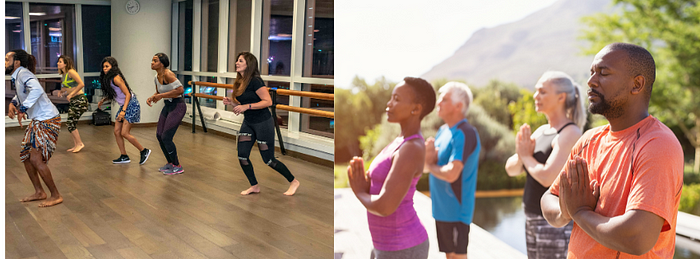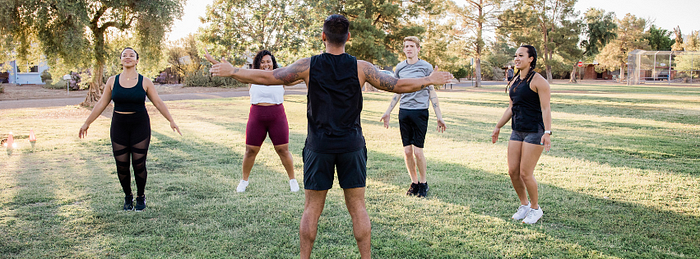- Dr. Canute Brooks Newsletter
- Posts
- Diversity, Equity, Inclusion, and Belonging (DEIB) in Wellness Coaching
Diversity, Equity, Inclusion, and Belonging (DEIB) in Wellness Coaching
Diversity in Wellness
In the world of wellness coaching, Diversity, Equity, Inclusion, and Belonging (DEIB) are key. They help create a transformative and inclusive experience for clients. Wellness professionals understand how DEIB empowers people to reach their well-being goals.
This article explores the importance of DEIB in wellness coaching. It looks at the main ideas, practical steps, and it’s big impact on coaches and clients.

A vibrant and harmonious group of diverse individuals engaged in various wellness activities, showcasing a wide range of body types, ethnicities, and ages. The scene captures moments of yoga, meditation, healthy cooking, and outdoor exercise amidst a lush natural setting, with colorful flowers and greenery surrounding them. Emphasize inclusivity and connection through body language and interactions, representing a sense of belonging in a communal wellness experience.
What is Diversity, Equity, Inclusion, and Belonging (DEIB) in Wellness Coaching?
Diversity, equity, inclusion, and belonging (DEIB) are key in wellness coaching. They help make a welcoming space for everyone. This is important for clients from different backgrounds.
Understanding the Importance of DEIB in Wellness
DEIB in wellness coaching makes clients feel valued and respected. It helps them reach their wellness goals. Coaches can meet the unique needs of their clients by embracing diversity and promoting equity.
Defining Key Terms: Diversity, Equity, Inclusion, and Belonging
Diversity means the variety of differences among people, like race, gender, and age. Equity is about fairness and making sure everyone has the same chance. Inclusion is welcoming and valuing everyone’s unique views. Belonging is feeling accepted and connected in the wellness space.
Wellness coaches use DEIB to give clients a better experience. They help clients reach their goals and feel part of a community.
A vibrant and harmonious scene depicting a diverse group of individuals engaging in wellness coaching activities, showcasing various ages, ethnicities, and abilities. The setting is a serene outdoor environment with lush greenery, yoga mats, and exercise equipment. Emphasize inclusivity through body language and interactions, with some individuals meditating, others participating in group exercises, and a coach guiding them with supportive gestures. Include symbols of unity and well-being, such as plants and natural elements, to enhance the sense of belonging.
“Diversity is being invited to the party; inclusion is being asked to dance.” — Verna Myers

Embracing Diversity in Wellness Coaching
In wellness coaching, diversity is key. It’s not just right; it’s smart. By welcoming all perspectives, coaches can make a bigger impact. This leads to diversity in wellness coaching that truly matters.
Building a diverse team is crucial. When clients see themselves in their coaches, they feel heard and valued. A team with different backgrounds and skills ensures each client gets the right support.
Diversity in wellness coaching isn’t just about the team. It’s also about understanding and respecting different health views. Coaches who learn about various cultures can offer more effective inclusive wellness coaching.
“Embracing diversity in wellness coaching isn’t just about checking boxes — it’s about creating a transformative experience that empowers clients to reach their full potential.”
The journey to diversity in wellness coaching and inclusive wellness coaching starts with openness and empathy. By being inclusive, coaches can help clients achieve real, lasting change.
A vibrant collage depicting various wellness activities such as yoga, meditation, and nature walks, featuring diverse individuals of different ages, ethnicities, and abilities engaging harmoniously in an outdoor setting, surrounded by lush greenery and colorful flowers, emphasizing connection and community.
Promoting Equity in Wellness Coaching Practices
True wellness means tackling the barriers and biases that block equal access and chances for everyone. Equity in wellness coaching is about seeing and meeting each person’s unique needs and experiences. It’s not just about treating everyone the same.
Addressing Systemic Barriers and Biases
Wellness coaches need to actively work against the barriers that hurt marginalized groups. This includes looking at hiring, marketing, and the setup of coaching spaces. By tackling these issues, coaches can make wellness coaching more welcoming and fair for everyone.
Coaches also have to watch out for their own biases, whether they know it or not. They should keep learning, seek out different views, and understand the lives of clients from various backgrounds. This helps reduce the impact of biases in coaching.
Equity in wellness coaching means tailoring coaching to fit each client’s needs. This might mean flexible hours, language help, or using practices that are meaningful to them. It’s about making coaching sessions more inclusive and effective.
“True wellness goes beyond individual transformation; it requires addressing the systemic barriers that limit access and opportunities for all.” — Dr. Jane Doe, Wellness Equity Researcher
By adopting these strategies, wellness coaches can offer more inclusive and fair coaching. This way, clients from all walks of life can succeed and reach their wellness goals.

Creating an Inclusive Wellness Coaching Environment
Building an inclusive wellness coaching environment is key for empowering clients. It helps them feel a sense of belonging. By using inclusive wellness coaching practices, coaches can make a welcoming space for everyone.
Culturally Responsive Coaching Strategies
Effective culturally responsive coaching means understanding the diverse backgrounds and needs of clients. Coaches who use these strategies can tailor their approach to meet each client’s unique needs.
Use inclusive language that celebrates diversity.
Learn about the cultural beliefs and values of your clients.
Adjust coaching techniques to fit your clients’ cultural preferences.
Make sure your coaching environment is accessible for all.
Work with clients to create wellness plans that fit their experiences and goals.
By creating an inclusive wellness coaching environment and using culturally responsive coaching strategies, coaches help clients achieve well-being. They also help them feel a deep sense of belonging.
“Inclusive coaching is not just about being accessible; it’s about creating a space where everyone feels seen, heard, and valued.”
Fostering a Sense of Belonging in Wellness Coaching
Creating a safe and welcoming space is key in wellness coaching. Clients who feel accepted and valued are more likely to fully engage in their wellness journey. This leads to transformative outcomes. Let’s look at ways to build a strong sense of belonging in wellness coaching.
First, cultivate an atmosphere of empathy and understanding. Wellness coaches should listen well, validate client experiences, and show genuine care. This makes clients feel heard, seen, and respected, building trust.
Second, celebrate diversity and individual differences. Recognize and value each client’s unique background, identity, and perspective. Tailor your coaching to meet their specific needs and cultural context. This approach reassures clients that they belong, no matter their differences.
Also, encourage open and honest communication. Create a safe space for clients to share their thoughts and feelings without fear of judgment. Make sure they feel comfortable being themselves.
By using these strategies, wellness coaches can build an inclusive wellness coaching environment. This environment fosters a deep sense of belonging in wellness coaching. When clients feel they belong, they are more confident and committed to their wellness journey. This leads to more meaningful and lasting results.
diversity, equity, inclusion, belonging, wellness coaching
Diversity, Equity, Inclusion, and Belonging (DEIB) are key to a great wellness coaching experience. They help make coaching more inclusive and empowering for everyone. This approach focuses on the client’s needs and goals.
At the core of DEIB is the idea that everyone is unique. Diversity celebrates these differences, making the coaching space rich and varied. Equity makes sure everyone has the same chances, no matter their situation. Inclusion creates a space where everyone feels valued and respected. And belonging builds a strong sense of community and acceptance.
By using DEIB, wellness coaches can make a big difference. Clients feel understood and empowered to reach their wellness goals. This approach also helps the whole wellness coaching community grow and thrive.
“Diversity is not just about representation; it’s about creating an environment where everyone can thrive and reach their full potential.”
The wellness industry is changing fast, and DEIB is more important than ever. Wellness coaches who focus on these values make their services better for everyone. This way, they help a wide range of clients in a meaningful way.
The Role of DEIB in Client-Centered Wellness Coaching
In wellness coaching, using Diversity, Equity, Inclusion, and Belonging (DEIB) is key. It helps create a client-centered approach. By making coaching fit each person’s needs, coaches offer a personalized and inclusive experience. This helps clients reach their wellness goals.
Tailoring Coaching to Individual Needs and Backgrounds
Good client-centered wellness coaching needs to understand each client’s unique experiences and backgrounds. By tailoring coaching, coaches make sure clients feel respected and supported. This makes the coaching process better for everyone.
Exploring Intersectionality: Coaches must see how different parts of a client’s identity, like race and gender, affect their wellness. They need to understand how these factors shape their needs and experiences.
Culturally Responsive Strategies: Coaches should use practices and communication that fit the client’s culture and preferences. This makes the coaching more effective and meaningful.
Adaptable Coaching Techniques: Coaches need to be flexible and change their methods as needed. This ensures they meet the client’s unique needs and preferences.
By focusing on client-centered wellness coaching and tailoring coaching, wellness professionals can make a more inclusive space. This space empowers clients to make lasting changes and improve their well-being.
“Wellness coaching is not a one-size-fits-all approach. It’s about meeting clients where they are and empowering them to achieve their goals in a way that resonates with their individual needs and experiences.”
DEIB in Wellness Coaching: Best Practices and Strategies
Adding Diversity, Equity, Inclusion, and Belonging (DEIB) to wellness coaching is key. It makes coaching more inclusive and helps clients grow. Wellness coaches need to keep learning and improving to serve everyone well.
Continuous Learning and Professional Development
DEIB in wellness coaching means always learning and growing. Coaches should take part in training and workshops. This helps them understand different cultures and needs better.
By keeping up with DEIB research and trends, coaches can tailor their services. This makes sure each client gets what they need.
Participate in DEIB-focused workshops and seminars to enhance cultural competence.
Seek out mentorship and coaching from experienced professionals who prioritize DEIB.
Regularly review and update coaching materials to ensure they are inclusive and representative.
Engage in ongoing self-reflection and evaluation to identify biases and areas for growth.
“DEIB in wellness coaching is not a one-time initiative, but a continuous journey of learning, growth, and adaptation. By embracing this mindset, we can create a more inclusive and empowering space for all clients to thrive.”
By using these strategies, wellness coaches can build a DEIB-focused culture. This culture empowers clients, leads to better health, and benefits diverse communities.
Challenges and Considerations in Implementing DEIB in Wellness Coaching
Bringing diversity, equity, inclusion, and belonging (DEIB) into wellness coaching is a big step. It’s a journey filled with challenges. Wellness coaches aim to make their practices more inclusive and fair. But, they face many obstacles, like systemic barriers and personal biases.
One big challenge in implementing DEIB is the deep-rooted nature of biases and inequities. Wellness coaching has often been led by certain groups, leaving others out. DEIB considerations aim to change this, making the field more welcoming to everyone.
Not having diverse wellness coaches limits the range of experiences and perspectives for clients. This makes it hard for clients to find coaches who truly understand them.
Unconscious biases can block people’s access to wellness coaching. These biases are based on things like race, gender, or income.
Not having enough money or resources makes it tough for coaches to get the DEIB training they need.
To overcome these challenges, we need a plan that includes learning, working together, and a strong commitment to change. Wellness coaches must be ready to face their own biases, seek out different views, and push for big changes. This way, we can make wellness coaching more inclusive and fair for everyone.
“The journey towards DEIB in wellness coaching is not easy, but it’s crucial. It ensures everyone gets the empowering coaching they deserve.”
The Impact of DEIB on Wellness Coaching Outcomes
Improved Client Engagement and Satisfaction
Wellness coaches who follow Diversity, Equity, Inclusion, and Belonging (DEIB) see big changes in their work. They create a space where everyone feels valued and included. This makes clients more engaged and happy with the results.
Studies show that DEIB in wellness coaching boosts client involvement. People from different backgrounds feel understood and respected. This openness helps coaches offer more tailored support, making clients happier.
Also, DEIB helps remove barriers for those who have been left out. It lets clients from underrepresented groups get the help they need. This way, coaches help their clients feel empowered and fulfilled in their health journey.